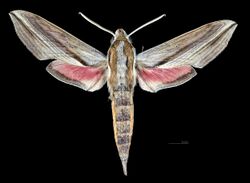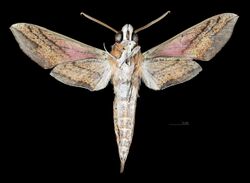Biology:Hippotion boerhaviae
| Hippotion boerhaviae | |
|---|---|

| |
| Male dorsal view | |

| |
| Male ventral view | |
| Scientific classification | |
| Domain: | Eukaryota |
| Kingdom: | Animalia |
| Phylum: | Arthropoda |
| Class: | Insecta |
| Order: | Lepidoptera |
| Family: | Sphingidae |
| Genus: | Hippotion |
| Species: | H. boerhaviae
|
| Binomial name | |
| Hippotion boerhaviae (Fabricius, 1775)[1]
| |
| Synonyms | |
| |
Hippotion boerhaviae, the pale striated hawkmoth, is a moth of the family Sphingidae.
Distribution
It is known from Sri Lanka, India , Nepal, Thailand, south-eastern China (Hong Kong and Guangdong), Vietnam, Indonesia, the Philippines , eastern Australia and New Caledonia.[2]
Description
The wingspan is 50–68 mm.
Biology
Adults sometimes visit flowers. They may travel long distances, either voluntary or involuntary.
The larvae mainly feed on Oldenlandia and Spermacoce species. In India, they have been recorded on Impatiens species, Spermacoce stricta, Spermacoce hispida, Glossostigma spathulatum, Boerhavia repens and Boerhavia diffusa. The host plant is Pentas lanceolata in Australia. The larvae are green with black and white spots along each side.
The pupa is silvery brown, with a row of black spots along each side.[3]
References
- ↑ "CATE Creating a Taxonomic eScience - Sphingidae". Cate-sphingidae.org. http://www.cate-sphingidae.org/taxonomy/Hippotion/boerhaviae.html.
- ↑ Pittaway, A. R.; Kitching, I. J. (2018). "Hippotion boerhaviae (Fabricius, 1775) -- Pale striated hawkmoth". http://tpittaway.tripod.com/china/h_boe.htm. Retrieved 15 December 2018.
- ↑ Herbison-Evans, Don; Crossley, Stella (22 April 2016). "Hippotion boerhaviae (Fabricius, 1775)". http://lepidoptera.butterflyhouse.com.au/sphi/boerhaviae.html. Retrieved 15 December 2018.
Wikidata ☰ Q2005397 entry
 |



